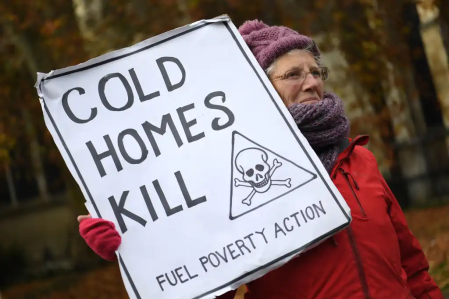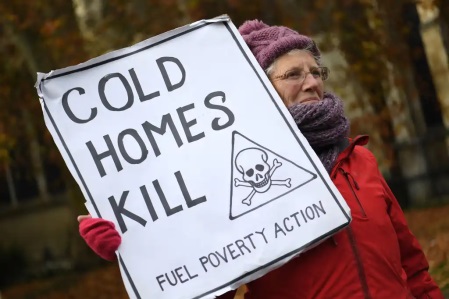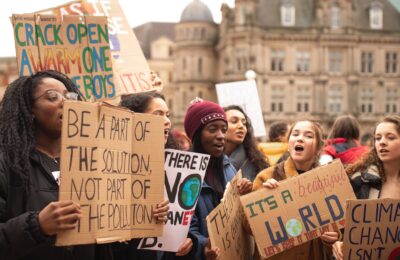Another piece from People and Nature.
Two clouds darken the sky. A close-up one: gas and electricity bills have shot up since the Russian invasion of Ukraine, and millions of families are struggling to pay. And a bigger, darker, higher one: the climate disaster, and politicians’ refusal to tackle it.
Ultimately, both these threats have a single cause: fossil fuels and the systems of wealth and power that depend on them. We need social movements to link the fight to protect families from unaffordable bills with the fight to move beyond fossil fuels, and in that way turn back global warming.
Here I suggest ways to develop such a movement in the UK, starting by demanding action on home heating.

Two linked crises
Since the government lifted the price cap on energy bills on 1 April, the average energy bill for 18 million households on standard tariffs rose to £1971 per year, from £1277. Another 4.5 million households on pre-payment schemes are paying an average of £2017 per year. And in October, bills could well rise above £3000.
There are now 6.3 million UK households (including 2.5 million with children) in fuel poverty, meaning that they are unable to heat their home to an adequate temperature. The End Fuel Poverty Coalition says that could rise to 8.5 million by the end of this year.
The main fuels for UK homes are gas, and electricity produced from gas and nuclear power. Retail prices have been driven up by a rise in gas, oil and coal prices on world markets – which started rising last year, as economies recovered from the pandemic, but shot upwards faster from March, after Russia’s invasion of Ukraine.
The war, and sanctions on Russia by western powers, could keep fossil fuel prices high for years. They have also driven global food prices upwards. This is the biggest bout of inflation worldwide since the 1970s.
And behind all this, also driven primarily by the excessive burning of fossil fuels, is the climate crisis.
The heat waves in India in recent weeks, that produced temperatures of 44-46 degrees C – close to the maximum human bodies can stand – have been a reminder that this crisis is now, not in the future.
The Climate Action Tracker estimates that, judging by the effect of government actions and policies, by 2100 we are heading for average temperatures between 2 and 3.6 degrees (most likely, 2.7 degrees) above pre industrial levels. The scientific consensus is that it’s unsafe to go above 1.5 degrees … and the UK Met Office says there’s a 50:50 chance that that limit could be breached, temporarily, at least once in the next five years.
We all want to do something, and it’s hard – overwhelming even – to work out where to start.
My suggestion: a broad-based campaign to insulate homes, and install decarbonised heating systems (most likely electric heat pumps, or a connection to renewables-powered district heating).
I’m not the first one to say this. And it’s not rocket science. But it has not happened yet.
Such a campaign could unite young people, angry at inaction on climate change, with people terrified about galloping fuel bills. It could make the link between climate policies and social justice in action, not words.
Here’s how such a campaign could respond to the government’s “energy security strategy”, and how it could open up deeper-going issues and challenge the social and economic structures that cause global warming.
The government’s “energy security strategy”
The first and most important thing about the Johnson government’s “energy security strategy”, is its cynicism and dishonesty.. Taking it at face value would be a mistake.
The strategy, announced on 7 April, after weeks of delay due to a typically dysfunctional internal row, combines genuine statements of intent (to support new hydrocarbons production and nuclear power) with vague references to decarbonisation, which have hardly any funding commitments attached.
Boris Johnson’s Introduction to the strategy, full of grandstanding exaggerations, is indicative: hydrogen is a “low carbon superfuel”, nuclear power is “affordable”, energy transition is held up by “needless and repetitive red tape” that the government will “slash through”.
Johnson’s lie, that giving North Sea oil and gas “a new lease of life” will “get prices down and keep them there for the long term” is crude, even by his standards. Because retail fuel prices are determined by a world market in which the UK will never be more than a price taker, refracted through decades’ worth of neoliberal reforms. And because a new oil field approved tomorrow would be unlikely to start producing before 2030, long after output needs to peak if climate targets are to be met.
The strategy is NOT a poor attempt at climate policy. It’s worse than that. It is PR for an approach that trashes climate targets, undermines the most effective decarbonisation measures and aggravates energy poverty.
Peter Somerville dissects the strategy in detail, in an article published on People & Nature today.
Second, the strategy focuses on big, expensive, long-term investments in energy production –new oil and gas production, and nuclear – and thereby damages the small-scale, cheap options such as onshore wind and solar.
No funding is allocated to onshore wind or solar; there is just a vague promise to simplify the regulation put in place in 2015 by David Cameron to stop onshore wind.
Other expensive, long-term investment commitments are for hydrogen and carbon capture and storage (CCS), both part of the survival strategies of fossil fuel companies, and both of little or no use for decarbonisation.
Third, the strategy obstructs rapid decarbonisation, not only by undermining onshore wind and solar, but also by frustrating energy conservation policies that could permanently reduce the amount of electricity and heat needed.
Retrofitting? Existing, inadequate support schemes for homeowners rehashed, while the actual rate of energy efficiency installations has fallen by 90% over the last decade. Heat pumps? An aim of 600,000 heat pump installations per year by 2030 – compared to 19 million that are needed. The installation rate so far is a dismal 10,000 per year.
The government is obstructing action on home heating deliberately. Urban planners and decarbonisation researchers have been screaming, for years, about its importance.
In 2018, the government’s own business and industry department, BEIS, did a big review of home heating options, which concluded that “growth in no or low-regrets low carbon heating” measures, including heat pumps, biomass boilers and solar water heaters, was the priority.
In 2020, the government’s own (pretty tame) Climate Change Committee found that some basic energy efficiency measures, mostly insulation, would reduce heat demand in homes by 12%; that on average, less than £3000 per home would need spending on insulation to get homes ready for a heat pump; and that “a clear set of standards” for new-build homes was needed.
The CCC has stopped short of advising the government to get a flaming move on with insulation. But in March, in an assessment of UK heat and buildings strategy, it warned of “policy gaps” and the danger of relying on market-based approaches.
The government refused to sort out a home heating strategy in 2018, or 2020, and is refusing to sort it out now – essentially for the same reason that it refused to protect public health during the Covid-19 pandemic: it would rather let citizens suffer, than work with the public sector and local government.
Its “no-strategy strategy” on home heating fits with its “maniacal, neoliberal hatred of the public sector – one of its few ideological principles”, I argued here.
Fourth, the strategy has been denounced in scathing terms by energy researchers, and even by energy company executives.
Michael Grubb of University College London, who has worked advising government and at the energy regulator Ofgem, denounced the strategy as “cowardly” and “incoherent”. The Financial Times journalist Helen Thomas wrote: “It is bizarre and self-defeating not to tackle energy efficiency head on.”
Michael Lewis, chief executive of E.ON UK, the second biggest energy supplier, said: “By abandoning any extra commitment to helping people to improve their homes”, the strategy “condemns thousands more customers to living in cold and draughty homes, wasting energy and paying more than they need to for their heating”.
ScottishPower chief executive Kevin Anderson told a House of Commons hearing on the fuel bills emergency that his firm had had 8000 calls in a week from people worried about paying. While families might get through the summer, “come October, it’s going to get horrific, truly horrific”.
The point is not that these capitalist bosses are going to lead the charge against the government’s criminal policies.
It is that the government’s approach is so short-term, so superficial, so beholden to lobbying by fossil fuel and nuclear interests, that even members of the ruling elite who think about the energy system for their day jobs are in despair.
Once we understand the level of the government’s short-termism, and political corruption, we can confront it more effectively.
How to respond
Clearly, writing reports, giving expert advice and urging the government to do the right thing is not enough. No-one understood this better than Insulate Britain, who last year took direct action such as blocking motorways, to demand:
(1) that the government “fully fund and take responsibility for the insulation of all social housing in Britain by 2025”, and
(2) “a legally-binding national plan to fully fund and take responsibility for the full low-energy and low-carbon whole-house retrofit, with no externalised costs, of all homes in Britain by 2030”.
These demands are 100% correct, in my view. They could form the basis of a big social movement, bringing together people worried about climate change with families facing unpayable heating bills and labour organisations who support a “just transition” away from oil and gas.
But building movements is hard work.
Insulate Britain activists, having bravely defied arrest to highlight this issue, have now moved on to supporting the (equally compelling) demand to “just stop oil” … but without the bedrock of popular support needed to confront the government, its fossil fuel industry backers and its neoliberal ideology.
I am not criticising people who use civil disobedience to demand climate action, who I respect and admire. I am asking: why are they not connecting with a wider social movement, when their cause – home heating as a key to decarbonisation – dovetails so well with the needs of millions of working people? That is a failing by all of us.
Rob Callender of Jubilee Climate points out that climate protest is vulnerable to the “aesthetic of co-option”. He argued:
If the appeal is to the establishment, and the conversation is with the establishment, then you are becoming the establishment.
Against this approach, Callender urged a turn to communities, “with the explicit aim of taking power into local hands, standing up for people in the community”.
What would that “taking power into local hands” look like? In my view, it could include practical actions such as:
□ Organising to protect families who can not pay their fuel bills, as Fuel Poverty Action and the local groups it supports do.
□ Linking climate protest with trade union action for a “just transition”. A good starting-point is the Leeds Trades Union Council’s campaign for retrofit and heat pumps, as an alternative to the pernicious proposals, backed by the fossil fuel industries, to turn the gas network in large parts of northern England over to hydrogen.
□ Demanding action from local (mostly Labour) councils, who have declared a “climate emergency” but failed to act on it. Local government would probably be central to any successful home heating strategy – and even after years of central government cuts, councils CAN spend money e.g. on retrofitting social housing. They could put the case for action on home heating, and act as a focus of opposition to government sabotage. Climate Emergency Manchester provides a great example of how to keep on a council’s back and dispute its greenwash.
□ Building links with co-ops and community energy projects that try to carve out economic and political space for decarbonisation locally, in the face of the government’s destructive policies, such as Carbon Co-op Manchester and South East London Community Energy.
□ Starting conversations in communities about how the energy system works; about powerful movements in the past that have demanded energy as a right, and/or a public service, rather than as a commodity; and about how we can become actors in getting the heat, light and electricity we need, rather than passive “consumers”.
What next for climate action
I don’t know if my suggestion of a focus on home heating will work. It’s certainly not a magic formula. But I know we need unity between climate action and broader social movements. In conclusion, here are three supporting arguments.
First, if we do not achieve this unity, we could face damaging divisions. Remember the “Yellow Vests” movement in France in 2018, triggered by the inclusion in the budget of a carbon tax on final consumers that led to the price of diesel going up.
The “Yellow Vests” – rightly, in my view – saw this as essentially a regressive tax, inspired by the government’s neoliberal economic strategy. Although the vast majority of the “Yellow Vests” (like most thinking human beings) agreed that action on climate was needed, they saw no reason why French working people should pay for it while elite privilege was protected. They were concerned about the alienation of the vast majority of French society from the political process.
The phrase “the elites talk about the end of the world, but we worry about the end of the month” was coined. Less well known was the slogan that responded to it – “end of the world, end of the month, same fight!”, which Rob Callender argues (and I agree) was the key to a “radical understanding” of the problem.
If we don’t confront the crisis of energy bills with a “same fight!” approach, then the populist right will step in, attacking the government’s “net zero” strategy with the false claim that decarbonisation will damage family incomes.
Second, without a social movement, the Labour party and trade union leaders could obstruct climate action nearly as much as the Tories.
Ed Miliband, Labour energy spokesman, has committed the party to retrofitting 2 million homes per year if/when it is elected, and that is welcome. But Labour has to be judged by actions, not words.
Its most powerful elected politician, the mayor of London, has capitulated to the haulage industry and other corporate interests and stood by the climate-trashing Silvertown tunnel project. The Manchester mayor has favoured the aviation industry with the climate-trashing Manchester airport expansion.
Where is the evidence that a Labour government will actually stand up to the fossil fuel and construction industries and adopt a bold approach?
As for the largest trade unions, they also call for retrofitting, but (Unite and the GMB) welcomed the government’s climate-trashing announcement of new investments in North Sea oil and gas, and (GMB and Trades Union Congress) support investment in nuclear, which will inevitably obstruct and delay renewables.
Third, our movement needs to get wise about technologies. Energy conservation, much of it with straightforward, small-scale technology – of which retrofitting and heat pumps are the prime example – is the key to tackling global warming.
Climate modellers estimate that conservation could cut global energy throughput by 40% and, combined with renewable electricity generation, decarbonise the world economy while meeting UN human development goals.
Integrating energy systems for maximum efficiency – which would mean challenging the corporate interests that produce electricity for sale as a commodity – will be a key part of such a transition.
Our movement could develop principles to favour small-scale technologies that can be used by communities (e.g. renewables and solar) over large, expensive ones marshalled by the state (e.g. nuclear); to favour integrated solutions that improve our way of living (e.g. urban transport systems with fewer cars) over technofixes (e.g. electric vehicles); and to limit, and treat with caution, technologies whose main purpose is to keep the fossil fuel industry in business (e.g. geoengineering, carbon dioxide removal and hydrogen). Simon Pirani, 16 May 2022
■ See also: The ‘energy security’ strategy that promises more oil and gas, by Peter Somerville





